
Some of the criminal skeletons rattling in the family cupboards!
(And the other side of the coin)
The Story of Ellen Wright
On 30th December 1882, Ellen Huxtable, of Berrynarbour in North Devon married Sandford blacksmith James Wright. Twenty-four year old Ellen was the daughter of farmer and churchwarden John and Harriet (née Perrin) Huxtable. Less than a month after the wedding Ellen was incarcerated in Exeter Prison, (right) where she would give birth to her first daughter. How did this newly married woman, from a respectable family find herself in such circumstances?
Around the time of their marriage husband James left the family business and moved to Swansea where he was working as a blacksmith, leaving his new bride with her parents. There were several Huxtable family members working in South Wales. Perhaps this prompted James to seek work there too. In any event his absence seems to have greatly upset his new wife. Did she know she was pregnant when he moved there or did the discovery contribute to her subsequent behaviour? What is certain is that she suddenly became desperate to be with her new husband. And this desperation drove her to a foolish crime.
On 19th January 1883 she cashed a forged cheque for £30 (the equivalent of perhaps £1400 today) at the National Provincial Bank in Ilfracombe. Her actions were muddled, and betrayed an ignorance of the banking system. She was bound to be apprehended, and she was, almost immediately. She made no attempt to deny her crime. She claimed that nobody else had been involved, and that she needed the money to join her husband in Swansea; she had already sent her husband £2.
She appeared before Ilfracombe magistrates the next day, and was remanded to the County Assizes in Exeter the following week when she appeared before Mr. Justice Grove. A medical certificate confirming the prisoner's pregnancy was presented. The prosecuting counsel said that before the offence, the prisoner had borne a most irreproachable character, and the officials of the National Provincial Bank would be glad if the judge could pass a merciful sentence. The judge said there had been a number of forgery cases that day, which suggested sentencing in the past had not been sufficiently severe. Clearly of the view that he was being lenient, he sentenced Ellen to 6 months imprisonment with hard labour. The Nominal Register for Devon County Prison, Exeter, records that Prisoner 860 Ellen Wright had two cuts across her left wrist. We can only speculate as to how she got those. Daughter Lilian was born to Ellen Wright on 19th May 1883 in HM Prison, Exeter.
Ellen and Lilian joined James in Wales after her release. By this time James was working as a signal man on the railway. A second daughter Florence was born in Cardiff in 1886 and a son Arthur was born in 1888. But sadly around this time the family broke up. James lost his job and Ellen left him for another man. Ellen and son Arthur moved to Newcastle with her new partner, Ernest Frayling. The daughters were brought up by their grandmother in Sandford. James reappeared in the 1901 Census working as a railway porter in Bradford, Yorkshire. He died there in about 1928.
His daughter Florence had joined him there in the early years of the 20th century. She married plumber Fred Rothera, and raised a family in Yorkshire. Daughter Lilian who had such an unhappy birth, went into domestic service in Muswell Hill, North London, and seems never to have married. But Ellen went on to have a daughter and two sons with her new partner, and son Arthur stayed with his mother and step family. Ernest Frayling died in 1899. Ellen brought her family up in Newcastle and Liverpool. In 1919 daughter Maud emigrated to the USA. In 1924 Ellen, her two sons and their wives and her grandson sailed to the USA to join her daughter; they all settled in Massachusetts.
Her son Arthur Wright remained in Liverpool for the rest of his life, where ironically, for many years he was a police constable. Ellen became a naturalised United States citizen in 1938. One wonders how she looked back on her six months of prison in 1883. Did she stay in touch with the daughter that she bore there? She died in 1939 and is buried in Malden, Massachusetts. And Ellen's story was concluded here thanks to her descendants who live there still.
George Bubear - Champion Fraud
At the end of his sporting career, cousin George Bubear (1859-1927) - professional sculler and twice Champion of England - seems to have fallen prey to the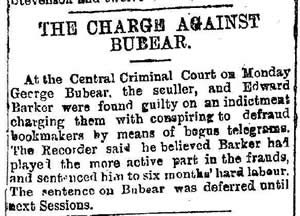 temptations of "easy money". At his peak he had won £500-£600 in prizes per year, at a time when the average wage was about £50 per year. No doubt his backers took the lion's share of the prizes, but George must have been comfortably off , not least because he was also working as a Licensed Victualler for much of his career. Over the years there had been several barely veiled accusations in the Press that some of George's races had been fixed - probably a common occurrence in those days, in a barely regulated professional sport where enormous sums of money were gambled. So it is likely that George was not averse to sharp practice where money was involved. Perhaps he saw the opportunity presented to him in 1898 as no more than an extension of match fixing. Though it must be said that several victims of his fraud bore witness to his previous upright character during the trial.
temptations of "easy money". At his peak he had won £500-£600 in prizes per year, at a time when the average wage was about £50 per year. No doubt his backers took the lion's share of the prizes, but George must have been comfortably off , not least because he was also working as a Licensed Victualler for much of his career. Over the years there had been several barely veiled accusations in the Press that some of George's races had been fixed - probably a common occurrence in those days, in a barely regulated professional sport where enormous sums of money were gambled. So it is likely that George was not averse to sharp practice where money was involved. Perhaps he saw the opportunity presented to him in 1898 as no more than an extension of match fixing. Though it must be said that several victims of his fraud bore witness to his previous upright character during the trial.The fraud was quite a complicated one, but essentially was a variation on the past-posting scam operated in The Sting. George was persuaded by bookmaker's clerk Edward Barker to make arrangements with several bookmakers to place bets by telegram. Barker, aided by George or other accomplices, would visit a number of post offices and hand in a batch of 15 or 20 telegrams, asking that they be time stamped and sent as soon as possible. After the post office clerk had time stamped and then started to send the batch (which would take the clerk some considerable time to code) Barker or George would interrupt and ask for the unsent telegrams to be returned to them on the pretext of making a correction. The telegrams were addressed to bookmakers, containing bets that George was placing on races that were about to start. The names of the horses had been left off the last telegrams in the batch. A confederate would determine by telephone which horse had won the race, and pass the name on to his colleagues in the post office. The winning horse's name was inserted in the telegrams. These were then returned to the post office clerk and were sent stamped with the earlier time. In theory the clerks were supposed to start the whole process again with a different time stamp when the sending of telegrams had been so interrupted, but in practice they either did not know the procedure or felt it to be too onerous. The first telegrams in the batches, sent on time, were bogus. The doctored telegrams arrived late, but the time stamp indicated that they had been sent before the race started so they appeared legitimate.
 Some of the bookmakers paid up. Most were suspicious of the long delayed arrivals of the telegrams, often thirty or forty minutes after the end of the race, and after the stamped time. Several challenged George, so he backed off and would not take any winnings if they thought there was something wrong with the bets,
"But there are two or three of us in the syndicate, and I have already
paid the others so I will lose out". Nonetheless he seems to have lost
his nerve when suspected. Several of the bookmakers were not content
with that, and reported their suspicions. In consequence George and Barker were arrested in June 1899 and sent for trial at the Old Bailey.
Some of the bookmakers paid up. Most were suspicious of the long delayed arrivals of the telegrams, often thirty or forty minutes after the end of the race, and after the stamped time. Several challenged George, so he backed off and would not take any winnings if they thought there was something wrong with the bets,
"But there are two or three of us in the syndicate, and I have already
paid the others so I will lose out". Nonetheless he seems to have lost
his nerve when suspected. Several of the bookmakers were not content
with that, and reported their suspicions. In consequence George and Barker were arrested in June 1899 and sent for trial at the Old Bailey.
The case was heard at the end of October, and both men were found guilty, Barker being sentenced to 6 months with hard labour, and the sentencing of George deferred. A clergyman and the Kingston MP, Mr. Skewes-Cox, spoke as character witnesses for George. The latter said that he had known Bubear for 10 years and that he was a man of excellent character and a very simple-minded man. The MP was sternly rebuked by the Recorder who said that as a solicitor he should know better than to abuse his position as an MP by giving testimony that was contrary to the rules of evidence (that George was a simple-minded man). He had no right to come there to champion a constituent. George was sentenced in November 1899 to three months imprisonment with hard labour.

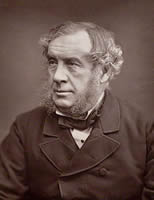
Mr. Justice Grove
Ellen Frayling née Huxtable, aged 76
Heard To The Rescue!
Melville Heard came to the rescue of one of the Heard family's employees when he intervened in an incident in the family offices in Newport. In August 1912, one George Freeman, a seaman from the SS Hugo and Clara, called at the offices of Jones, Heard and Co, Ship Brokers, at 107 Dock Street, Newport. He approached Peter Cessac, who worked as consular clerk for Arthur Heard, who was German Vice-Consul with the firm. He demanded his discharge book from the German ship. He was told it was not there. "I know better and I mean to get it," he swore. At this he broke into a rage, becoming abusive and violent. Pulling a long knife from a sheath he threatened to tear Cessac's stomach out. Fortunately Melville Heard, who was a Ship Broker with the firm, happened to be on the grond floor when he heard Freeman swearing, and going to see what the trouble was, he came upon the seaman raging and threatening Cessac with the knife. Melville managed to push the door to on Freeman, shutting him outside as he slammed it. Jumping about like a madman, he remained outside the offices for 20 minutes until the police appeared and arrested him. Freeman appeared before Newport magistrates charged with using violent and abusive language and threatening behaviour. He was bound over for three months and was ordered to pay costs.Charles Vestey 1897-1964
Vestey was my 3rd cousin once removed, descended from my g-g-g-grandfather William Milton. He emigrated to Australia in 1923. When I was searching for evidence of his life in Australia, I came across these two reports in the Perth newspapers of 20 and 21 June 1930. It would appear that crimes of this nature were dealt with in the Children's Court then, in order to protect the child, and that there were limits to the sentences that could be passed in that court.
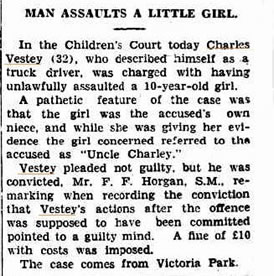
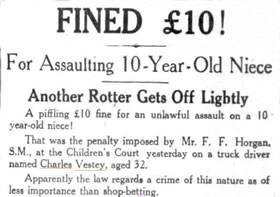
The church at Nymet Rowland
The Cheriton's house, front and back, at Nymet Rowland, photographed in about 1860 by our relative William Hector. Knowing a photographer would be unwelcome, he took the photos believing the house to be empty, but was alarmed to find that there was a child at home. Fearing a stoning he beat a hasty retreat.
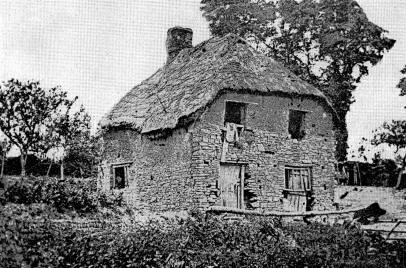
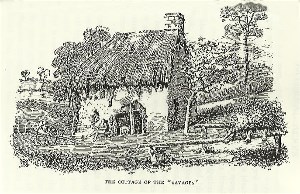
Sketch of the savages' cottage by F. Bligh Bond for S. Baring-Gould's publication
An Old English Home and its Dependencies
An account of the Cheritons by Peter Christie - The True Story of the North Devon Savages - can be found in the Transactions of the Devonshire Association, Volume 124, 1992, pp 59-85.
Delinquent or Deprived?
The Tamworth Herald of 2 December 1905 reported the theft of a motley collection of objects stolen from the house of labourer Alfred Hodkinson. These included a silver watch, a silver albert, 9 keys, 11s 9d cash, three pocket handkerchiefs, a pair of scissors and a tame rabbit, the sum of items stolen being £2 9s 6d. After a series of lies and excuses the culprits who confessed were our Mary (15), Samuel (12) and Sarah Jane (10) Lynes. The robbery was instigated by Mary who kept the daughter of the house out of the way whilst her brother and sister broke in and stole the items. The missing items were hidden in various places. When asked to produce the rabbit the children brought a plate of bones from the kitchen. The rabbit had been cooked and eaten. It emerged that the children were fed largely on bread and dripping by their widowed father. The children apologised for their crime. The case against Sarah was dismissed, the father was bound over in the sum of £5 for 6 months to keep Mary out of trouble, and Samuel was sentenced to six strokes with a birch rod. The story below suggests that Sarah suffered much hardship in her life. .
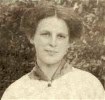 Sarah Lynes some years later
Sarah Lynes some years laterThe North Devon Savages
Great-Great-Great Aunt Harriet Frost had some strange daughters-in-law. They were members of the disreputable Cheriton family from the tiny parish of Nymet Rowland, who were characterised as the infamous North Devon Savages. In 1869, a letter to the Times described their "Heathenism in Devon" -"the manner in which these people live is of the rudest, coarsest, and even savage-like character". The family were
labeled "a terror and an abomination" to the district. Over the years they were to be the subject of much Press coverage, both national and local, and their activities were brought to the attention of the Home Secretary. Patriarch of the family was farmer Christopher Cheriton, owner of Upcott, some 40 acres of freehold land. Christopher and his common law wife Mary Ann Bragg had flouted conventional standards by having their four children out of wedlock, though that was common enough. According to one account Christopher had rejected conventional mores after being spurned in love. The mate with whom he spent his life seems to have supported him in his chosen lifestyle. By about the mid 1850s the Cheritons had embarked on a course of extreme social degradation. The family comprised Christopher and Mary Ann, and children William, Charlotte, Eliza and Matilda, and at the height of their reign of terror there were grandchildren in their early teens and a clutch of babies. In a nearby parish, "on Whitestone Hill", Tedburn St Mary, was Christopher's brother Elias, living in an old barrel.
In 1854 Christopher appeared before the magistrates on a charge of assault. This seems to have been the first appearance in court. But over the next 25 years, members of the family were to appear before the courts over 65 times. They were charged with assaults, petty theft, poaching, non-payment of rates, allowing animals to stray (they weren't too fussy about whose land their livestock grazed on). Poaching in particular was a serious offence in those days, and when, in 1869, son William and friend George Bradford alias Tancock (who was to partner Charlotte) were convicted under dubious circumstances, they briefly became a
cause celèbre, prompting debate in the national Press. Mary Ann, Eliza, Matilda, Charlotte and William all served prison sentences over the years, some several: all the family were fined on numerous occasions.
But this was not just a criminal family. Indeed many of the charges brought against them were dismissed. It was their general lifestyle that marked them out. Their clothes and persons were unkempt and unwashed. They lived in a hovel, in filth and squalor, in a kind of barn, with their animals. A contemporary account in 1874- "The building is not large, ... originally a farm-house, a granary, or merely a cow-house. It is perhaps forty feet long by twenty-five feet wide; its walls are apparently a mixture of lime, mud, and pebbles, and very thick; and the thatched roof is surmounted by a wide-mouthed chimney-opening, partly blown down. ... There are several apertures, designed and accidental; but the main opening...is a jagged hole about seven feet high and five wide, into which, by way of
window blind, ragged bundles of straw are piled...the ground floor of the hovel is at once the living-place, the cooking-place, the pig-sty, and the sleeping-place. Not a single article of furniture is contained within it; there is not even a bedstead. The family bed, on which repose savage old Christopher, Willie his middle-aged son, the old woman, the three strapping daughters, the big boy and the big girl, and the smaller fry, including the horrifying baby or babies, consists of an accumulation of foul straw, enclosed within rough-hewn posts driven into the earth."
Several accounts make reference to acts of vandalism against, and verbal abuse of their neighbours. There was a long-running feud with some of the local farmers. Landowner John Partridge took Mary Ann and Eliza to court for stealing turnips, and there seems to have developed a particular antipathy against Partridge and his family. In the same vein the family were extremely hostile towards the local parson - the Reverend Temple - whom they cursed roundly at every opportunity, abusing him and his new wife as they walked around the village. The family were foul-mouthed, abusive and aggressive. They regularly worked in their fields in semi-nudity, the old man often wearing just a loin cloth, the women little more. Predictably it was their sexual immorality that outraged most Victorian commentators. The contemporary belief , implied in a number of articles and letters about the family, was that the children of the several daughters were the incestuous offspring of the males of the family, who all shared the communal bed. Between the three daughters there were at least eight children born without named fathers between 1855 and 1871. Witnesses declared that no men outside the family were known to have visited the daughters. Nonetheless given the condition in which they did their field work there can be no certainty about the bastards' parenthood.
The women were regularly described as being coarse, with the voices of men. Brother William was a big man, with matted whiskers and a long beard, and the sight of him was intimidating. He is said to have pursued a stranger through the country with an axe for nearly a mile! One day William was seen driving a horse whose collar he had decorated with the entrails of a sheep! It should not be thought that the family were impoverished. Their land, their animals - at various times 4 horses, 29 sheep, pigs, 2 or 3 cows, 2 bullocks, 6 ducks - meant that they were much better off than agricultural labourers. But they chose to do no more than exploit their land and livestock on a subsistence basis only. With theft and extortion to supplement that.

The 1851 census shows the Cheriton family living at Upcott, their property at Nymet Rowland
Whilst it is evident that this was a wild, unconventional and lawless family, they seem to have been courteous to strangers who meant them no harm. And according to the pastor of the Independent Chapel in Lapford, they were frequent attenders there for worship. When the Rev Temple had been replaced as the incumbent of Nymet Rowland by the Rev Gutteres, it was reported that the family donned their Sunday best and worshipped at the parish church. (This apparently did not prevent them from allowing their animals to graze on the Rev Gutteres' tennis lawn, ruining it for the summer).
Perhaps not unsurprisingly their behaviour incited aggression in return - in 1878 four men were summonsed for stoning the Cheritons' house for over two hours. In 1879 a rick of wheat belonging to William was burned. Some of the charges against the family even appear to have been trumped up with the collusion of the constable, no doubt at the instigation of the local landowners, including John Partridge. In the 1870s there seems to have developed a concerted effort to rid the parish of the Cheritons. Unnecessary really, as Time intervened. Despite their numerous illegitimate children, one by one the daughters left home to set up house with a partner, or to get married, each adding several children to their family with their partners. Charlotte moved out of the family bed pit initially to set up home with George Bradford alias Tancock in a nearby hay rick! Willoughby Farley - son of Matilda - was eventually to marry my second cousin 3x removed Mary Ann Drew. G-g-great aunt Harriet Frost was the stepmother of Eliza's husband John Drew, and mother of the husbands of two of Charlotte's daughters. (The convoluted sexual relations continued through the generations when John, a base son of Charlotte, married a daughter of Matilda, in 1890, by then called Virginia Farley after her stepfather. The bride was to die within 3 months. Ostensibly cousins, who knows who their father(s) was or were, though in all probability John was the son of George Tancock.) In 1880 matriarch Mary Ann (described as a foul-mouthed hag) died of bronchitis. Son William seems to have set up home with a partner Bessie in Zeal Monachorum. Now an old man, Christopher left the parish to live with one or other of his married daughters. By the 1881 census all the savages had left: no Cheritons were living in Nymet Rowland.
This article from the Victorian Press is fascinating. How true is it one wonders?
![]() Download a catalogue of the cases against the Cheritons.
Download a catalogue of the cases against the Cheritons.
|
Sarah Lynes |
"A TERRIFYING LIFE"
PAYHEMBURY WOMAN'S TALE OF WOE Walter John Heard, an agricultural labourer, of Payhembury, was summoned at Ottery St Mary yesterday for persistent cruelty towards his wife, who applied for an order for separation and maintenance. Mr. M.J.McGahey, for Mrs. Heard, said she was married to defendant at Heavitree in 1913. There were eight children now alive, six of them of young age under her care. Defendant's conduct during the whole of their married life was of such a nature that the Bench would agree he had led a most terrifying life. The cause of it was mainly drink, and it was alleged he had not been sober two nights a week. The wife had received hundreds of black eyes, and defendant had taken razors and threatened to cut the throats of all the family. Mrs. Heard left her husband on August 2, and went into the Honiton Union with the younger children. On that occasion he came home very drunk, caught hold of her, and tried to throw her in the fire, nearly choking the life out of her. He then got a hedge hook and said he was going to cut the heads off them all. Defendant had now promised to amend, but that could not be accepted. He might be sober for a fortnight, and then they would have the same thing all over again. Mrs. Heard said on one occasion defendant told the children they would soon be motherless, as he was going to shed plenty of blood. Defendant said he would take all the blame, but pleaded with his wife to give him another chance, promising her he would reform. She declined to do this and the Bench made an order for separation, defendant to contribute £1 a week towards his wife's maintenance. The Western Morning News and Mercury, August 14 1930 |
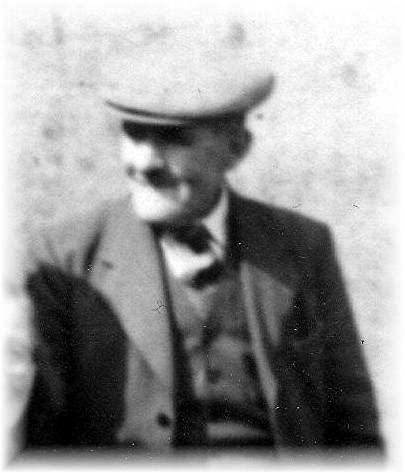 Walter Heard |
The Photographer's Daughter, Seduction and Murder
"Devon Winter Assize
William Taylor, 36, an accountant, ... was charged with having, on the 18th August last, at Crediton, feloniously administered certain noxious powders to Mary Ann Hector, the prosecutrix, with intent to procure her miscarriage. Mr. Bere, prosecuting, in opening the case, said the prisoner was a man in a respectable position of life, and was in the employ of Mr. Badcock, a wine and spirit merchant, at Crediton, as an accountant. At the latter end of last year the prisoner was a married man, and had four children. Mary Ann Hector, the prosecutrix, was then in the habit of assisting the prisoner's wife in the household duties as a daily servant. Mrs. Taylor died in November 1858, and Mary Ann Hector was then taken as the domestic servant in the house. She was seduced by the prisoner, who, the prosecution now alleged, had administered or caused to be taken by her certain noxious drugs to procure an abortion. Mary Ann Hector testified that she was fourteen years of age, in the prisoner's service, and after the death of his wife, whilst she was a live-in servant, “familiarities occurred” in the parlour. He seduced her. In August last, in consequence of some conversation, the prisoner promised to get something from a chemist's for her, "which would set it all to rights." A few days after he gave her some powders, which he told her to take. On taking the first, about the middle of August, she found it had a sickly, burning taste. The prisoner told her, if questioned why she took it, to say it was for a sick headache. After taking it she was sick and fainted, and was ill for some time. The following day another powder was administered with the same effect. After the administering of the second powder, she left the prisoner's service. Three weeks subsequently she again visited the prisoner. He again gave her some powders; and she said she "could not bear the thought of taking them." He said - "Can you bear the thought of giving birth to a child?" She replied - "That would be worse still." He gave her more powders and a mixture which he told her would "produce a miscarriage." Again these had no effect except to render her sick. Her family shortly afterwards discovered the intimacy which existed between Mary Ann and the prisoner, and these proceedings were then instituted. Cross-examined Mary Ann asserted that she did not recollect that she had ever told the prisoner she was enceinte. The prisoner had said he would not give her anything after the child was alive. The prisoner, on his arrest by P.C. Lamacraft, stated that he wished not to be apprehended. "Go," he said "and fetch her mother. I'll give anything to settle the matter, as I know I have done wrong; but I am not guilty of that which is specified on the warrant. The girl has taken nothing but salts and senna, which she mixed herself and took away, and that is what they charge me with, I suppose." Mr. H. F. Warren, surgeon, stated that from the evidence he had heard from the prosecutrix, as to the effect the powders had caused, he should say that it was a noxious drug. He could not name the drug taken, but that it is a matter of opinion formed from the evidence which I have heard. Mr. A. J. Caning, surgeon, gave similar evidence. He should say that the drugs administered were noxious. This concluded the case for the prosecution. Mr. Carter submitted that there was no case to go to the jury, but his Lordship decided that there was. Mr. Carter then addressed the jury for the defence. He submitted that although it was to be regretted that the prisoner had been guilty of an indiscretion, yet the jury were not to try him for that offence. The question was aye or nay, did he on the 18th August administer to the prosecutrix any noxious powder with the intent charged; for although subsequent events had been introduced into the case, the jury had not to try him on these. The case for the prosecution rested solely on the evidence of the prosecutrix, to whom he contended the jury ought to attach but little weight, as she was evidently an accomplice in the case. His Lordship having summed up, the jury retired to deliberate, and were absent nearly two hours. On returning into Court they said they found the prisoner guilty of the attempt. The Judge: Do you find that it was a noxious thing? A Juror: We cannot say it was a noxious thing. The Judge: Then you say not guilty? A Juror: No, my lord, I can't say that. The Judge: Then you must go back again. A Juror: By a noxious thing we mean poison - (Laughter) The Judge: You had better go back to your room and reconsider your verdict. " The jury retired, and after the Judge's direction changed their verdict to Not Guilty.
William Robert Taylor was born in 1834 in Dunster, Somerset the son of a tea merchant. In 1849 he married Hannah Farmer. By 1851 they lived in Huish Champflower, where he was the parish school master. By the time they left Somerset to move to Crediton they had four children. In Crediton he worked for Badcock & co, wine and spirit merchants, as their senior clerk, living near the Star Inn at the East end of town. According to his employer he had been of good character.
The residents of Crediton were shocked by the verdict. Taylor was sacked, although it was several months before he moved out of Crediton, to Exeter, where he was took a job as a travelling salesman with Mr. Hadley, spirit merchant, and Messrs. Fraser and Thirkettle, tea merchants. In due course Mary Ann Hector gave birth to a baby daughter (Mary Louise) in Crediton and in May 1860 went to court and was awarded maintenance of two shillings a week from Taylor. Mary Ann was the daughter of our photographer, William Hector. Her baby Mary Louisa was brought up by her grandparents. She died when only 15. Mary Ann could not stay in Crediton after the court case. The family knew our Sandford Picketts; Richard Pickett had moved to London and married, and was carrying on his tailoring business in St Pancras. He and his wife took in Mary Ann as a servant. She seems to have settled happily in the capital. In 1867 she married a bricklayer, James Davies. They settled in Twickenham where he became a general shopkeeper. He and Mary Ann had ten children, of whom six survived. Mary Ann died in Twickenham in 1908 aged 62.
William Taylor's subsequent life was very different. For a year Taylor's conduct and his accounts in Exeter were exemplary. Then on one of his sales trips through Somerset, Taylor met Martha Ann Giles, 21, of Wincanton. Soon she moved in with him in Exeter where they lived as husband and wife in Paris Street. His behaviour began then to deteriorate. In 1861 he started to get into debt. He lost his job with Hadley, who issued a warrant against him for embezzling £120. Taylor and his partner fled, settling in Bideford where he started a business selling spirits, but he again ran up significant debt. He was accused of forging his father-in-law’s signature to get credit. The Taylors then disappeared with the children. One of his creditors pursued him to Manchester but never caught up with him. In Manchester the Taylors rented a house in Bury New Road. William Taylor complained several times to the landlord’s agent, one Evan Meller, about the condition of the boiler in the kitchen. On the evening of 19 January 1862, during very cold weather, the pipes froze and the boiler exploded. Taylor’s six year-old daughter Harriet Jane had been sitting in front of it and was struck by exploding boiler, thrown across the kitchen and badly scalded. She was taken to Manchester Infirmary where she died the next day. At the inquest a verdict of “accidental death” was recorded. The jury severely censured Mr. Meller for not taking action on the boiler. Taylor refused to pay his rent and Meller
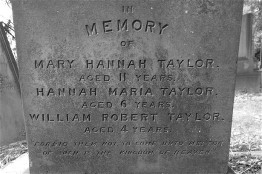 sent the bailiffs in, who removed all the furniture. On Friday 16 May
1862, just after 9 a.m. William Taylor and his wife went to Meller’s
office where Taylor attacked him and stabbed him eleven times
with a ten inch butcher’s knife. He then attempted to shoot him in the
head with a revolver. An ambulance took Meller to the Infirmary
but he was pronounced dead. While searching the Taylor family home,
police officers made a grim discovery. Lying side by side on the
floor of the bedroom were the bodies of his three children. They had
been neatly “laid out”. Each had a piece of paper on their chests: on
one side were their names and ages, on the other was written “We are
six, but one at Harptry lies: thither our bodies take. Meller and son
are our cruel murderers but God and our loving parents will avenge us.
Love rules here we are all going to our sister to part no more”. On
another bit of paper was written “Meller our sister slew through gross
neglect.” Post mortem examinations of the children failed to establish a
cause of death, although poisoning was suspected. William Taylor and
his wife were both charged with murder and were tried on 21 August 1862. They both pleaded not guilty.
Taylor's defence was a claim of insanity, but the jury found him guilty. His wife
was acquitted. He was sentenced to death and hanged at Kirkdale Prison
in Liverpool on 13 September 1862.
Thousands of people attended the funeral of his three children when they were buried beside their sister’s grave in Manchester’s General Cemetery. A public subscription had raised £60 for a
plot
memorial stone so they would not have a pauper's grave.
sent the bailiffs in, who removed all the furniture. On Friday 16 May
1862, just after 9 a.m. William Taylor and his wife went to Meller’s
office where Taylor attacked him and stabbed him eleven times
with a ten inch butcher’s knife. He then attempted to shoot him in the
head with a revolver. An ambulance took Meller to the Infirmary
but he was pronounced dead. While searching the Taylor family home,
police officers made a grim discovery. Lying side by side on the
floor of the bedroom were the bodies of his three children. They had
been neatly “laid out”. Each had a piece of paper on their chests: on
one side were their names and ages, on the other was written “We are
six, but one at Harptry lies: thither our bodies take. Meller and son
are our cruel murderers but God and our loving parents will avenge us.
Love rules here we are all going to our sister to part no more”. On
another bit of paper was written “Meller our sister slew through gross
neglect.” Post mortem examinations of the children failed to establish a
cause of death, although poisoning was suspected. William Taylor and
his wife were both charged with murder and were tried on 21 August 1862. They both pleaded not guilty.
Taylor's defence was a claim of insanity, but the jury found him guilty. His wife
was acquitted. He was sentenced to death and hanged at Kirkdale Prison
in Liverpool on 13 September 1862.
Thousands of people attended the funeral of his three children when they were buried beside their sister’s grave in Manchester’s General Cemetery. A public subscription had raised £60 for a
plot
memorial stone so they would not have a pauper's grave. Hard Labour
It was common for Victorian prisoners to receive sentences of imprisonment accompanied by hard labour - and this was applied to both men and women.
The punishment was indeed hard labour. Prisoners were set to work outside the prison in gangs on quarrying and road building. But there was also hard labour within the prisons. All longer term sentences usually carried a term of hard labour and it also formed a part of the transportation sentence. In the early 19th century, children were often sent to work alongside adults.
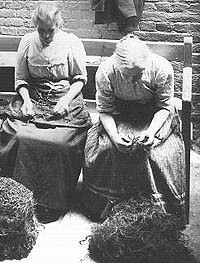

It was believed that the work would occupy the idle hands of prison inmates, that it would teach them the facts of a working life, and that it would provide cheap labour under some circumstances. During the Napoleonic wars, there was opposition to transportation because labour was needed in the dockyards. Men incarcerated in the prison hulks worked on dredging the Thames or in the naval dockyards. Others were sentenced to work on ballast lighters. One of the reasons for transporting prisoners to
Australia, was to provide labour to support the settlers.
In the prisons hard labour was often carried out in a prisoner's cell or under guard in silence. Most prisons had a treadmill installed (left), where the prisoner simply walked the wheel. Sometimes the mill provided flour to make money for the gaol, from which the prisoners earned enough to pay for their keep. However, in later times, there was no end product and the treadmill was walked just for punishment. Another equally pointless device was the Crank. This was a large handle, in their cell, that a prisoner would have to turn, thousands of times a day. This could be tightened by the warders, making it harder to turn, which resulted in their nickname of 'screws'.
A common task particularly for women and children was picking oakum (above right). Oakum is a preparation of tarred fiber used in shipbuilding, for caulking or packing the joints of timbers in wooden vessels and the deck planking of iron and steel ships, as well as cast iron pipe plumbing applications. Oakum was at one time recycled from old tarry ropes and cordage, which were painstakingly unraveled and taken apart into fiber. This was the task that prisoners were obliged to undertake, unraveling between one and two pounds per day. These punishments were not abolished until 1898. Hard labour for prisoners was finally abolished in 1948.
John Ashplant 1845-1901
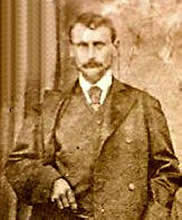 John Ashplant was a sad case. Violent when in drink, his wife would hide in fear from him in the washhouse. Eventually she left him and took their young children with her to Crediton workhouse to escape his brutality. In 1899 and 1900 the minutes of the Board of Crediton Union Workhouse record the fact that John Ashplant was refusing to pay 5s maintenance for his two children, and was refusing to remove them from the workhouse and maintain them himself. The Board resolved to take action against him. John was summonsed, and received three gaol sentences for his failure to pay the maintenance. But Fate was to tragically intervene in the case of John. Shortly after his release from the third sentence, he was killed by a train. He was apparently struck whilst walking home to Crediton after working at Cowley Bridge. Accident or suicide - the coroner determined the former.
John Ashplant was a sad case. Violent when in drink, his wife would hide in fear from him in the washhouse. Eventually she left him and took their young children with her to Crediton workhouse to escape his brutality. In 1899 and 1900 the minutes of the Board of Crediton Union Workhouse record the fact that John Ashplant was refusing to pay 5s maintenance for his two children, and was refusing to remove them from the workhouse and maintain them himself. The Board resolved to take action against him. John was summonsed, and received three gaol sentences for his failure to pay the maintenance. But Fate was to tragically intervene in the case of John. Shortly after his release from the third sentence, he was killed by a train. He was apparently struck whilst walking home to Crediton after working at Cowley Bridge. Accident or suicide - the coroner determined the former.
Our Riotous Cousins !
In the midnight hours of Saturday 30th October 1852 PCs Martin and Holway were patrolling in the West Quarter of Exeter, when they encountered a noisy crowd in Frog Street. With difficulty the constables managed to disperse them, but a short while later their attention was called to nearby West Street
(below), where they found "the rabble of the city, behaving in a riotous manner" There were some 20 or 30 men gathered, and amongst them, shouting abuse and about to start a fight, was James Cann, the nephew of our wrestling champion Abe Cann. PC Martin apprehended James, but the policeman was immediately set upon by his brother Abraham Cann, who rescued James. Abraham was himself arrested, and a man called Hartnoll came to the aid of the two constables But the three were outnumbered by the mob, some accounts stating there were almost 100 persons then present, and a George Lewis then rescued Abraham. PC Holway grabbed him, but was knocked down, and he was then obliged to use his staff to defend himself. About then mayhem broke out, and the mob set upon the two policemen and their helper. 
The battle seems to have raged around the streets of Exe Island, and things looked particularly bad for constable Martin. He had been knocked down and was surrounded by three or four men kicking his head and body. He cried out "Murder!" and Holway and Hartnoll managed to extricate him from the crowd, unconscious and bleeding. The constables escaped to the safety of their nearby station house, all with injuries from kickings and beatings, but Martin in particular had been severely beaten, and was taken to hospital where he remained for a week, unable to speak or move.
A number of the rioters were arrested in the days following the assaults, including brothers James and Abraham Cann. They were remanded in custody until the Exeter Quarter Sessions in January 1853. Seven men were charged with assaulting police, including Lewis and the Cann brothers. There were several witnesses to the various assaults, and the accused did not have
much of a defence. After three hours of deliberation, all seven were found guilty. Three of the defendants, including Lewis, were sentenced to 12 months with hard labour, whilst Abraham and James Cann seem to have got off relatively lightly, with sentences of 3 months hard labour each.
Abraham and James were about 29 and 28 respectively at the time of their arrest, and both were skilled artisans - Abraham a coach painter and James a harness maker. They lived with their mother in Weight Court, off nearby Cowick Street. By the time of their arrest their father, James Cann, a wrestler himself, and a butcher, had been dead for three years, having been one of the few victims of Exeter's second cholera episode, in 1849. There is no evidence of father James living with his wife Thomasine, so perhaps the seven Cann children were brought up without the presence of a father.
Neither brother got into trouble again. Both moved away from Exeter, Abraham staying for a while with James and his wife in London. Unsurprisingly alcohol played its part in the unruly events of that night. The West Quarter and Exe Island were amongst the poorest parts of the city, the site of unsavoury workplaces, and overcrowded slums, where the inhabitants made use of the many pubs and beer shops to take the edge off their often miserable lives.
Elizabeth Connibeer
Cousin James Connibeer's wife of less than 6 months, Elizabeth, née Burgoyne, received 6 months hard labour with 4 weeks solitary, when she and her brother G. Burgoyne appeared at the Devon County Sessions in February 1832. Her brother had stolen two pairs of shoes valued at 4s from his master John Berry of Crediton (thought to be a cordwainer, and not related to our Berry family), for which he was sentenced to one month hard labour, two weeks solitary and a whipping. The new Mrs. Connibeer had feloniously received the shoes, knowing them to be stolen.
Victims of Crime -
Ivy Berry
Cousin Ivy Berry suffered an unpleasant shock when she was awoken at quarter to midnight in October 1961. The 77 year-old retired school teacher, who was living in the Berry family house, Wisteria, Western road, Crediton, had been disturbed by a noise at the French window of her bedroom, where she saw a man standing behind a net curtain. He threatened to "bash her face in if she didn't tell him where there was money". Spotting a jewellery box in the bedroom, the man grabbed it and retreated through the window. It seems his luck was out however.Outside the window was PC Leslie Knight who had seen the man silhouetted against the light in the ground floor window. Perhaps the constable had his suspicions aroused by the man and followed him. Certainly his presence there was fortunate, for when the man came running out through the window, PC Knight arrested him. William Riley, of no fixed abode, was charged with breaking and entering, and stealing jewellery and articles to the value of £30. Ivy was much shaken by the incident. In less than 6 months she had died.
Wisteria, Western Road Crediton. On the former site of Berry's building yard, the house was occupied by various Berry descendants until the late 1960s.
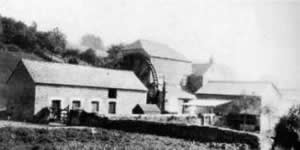 Washbrook Mill
Washbrook Mill
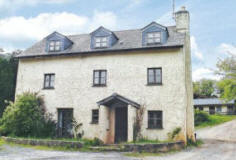
Chittlesford Mill
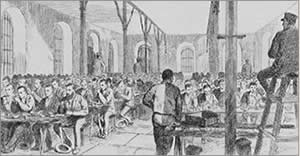
Convicts in Kingston Penitentiary, 1875
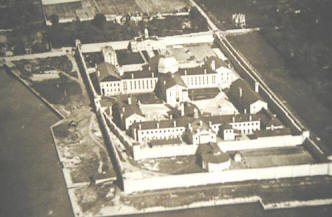
Kingston Penitentiary
![]() Download a list of Richard's prison misdemeanours.
Download a list of Richard's prison misdemeanours.
Thanks to Jane Sweet for her dogged and diligent research, and to Brockville Museum for their assistance
Heard Exploited?
This brief report appeared in The Western Times, 18 March, 1903Nine months for nine months?
In February 1901 John Wensley was indicted for perjury after refusing to pay maintenance for a child that he had fathered. The mother, Dora Grant, stated at Chichester Assizes that she had been going out with Wensley, was even briefly engaged to him, and that the child was certainly his. He swore on oath that he was not the father. The court was satisfied that sufficient evidence had been brought and after 10 minutes deliberation the jury found him guilty. The judge said that the offence of perjury was a serious one, and sentenced him to nine months imprisonment.PO Fraud
Frances Broom, 24 year old servant and fiancée of Sharland cousin Denis Burnett, claimed that she had been out of work and hard up when she tried to obtain 30s by fraud from Tiverton Post Office. She made entries in her PO Savings Book for two fictitious deposits, of £2.10s that had never been paid in, and forged the initials of a clerk who had previously signed her book. There was no stamp however. Then on July 19th 1939 she presented her book at the Post Office and asked to withdraw 30s which she did not have. The PO was busy and the clerk spotted nothing out of the ordinary and gave Frances the money. Had the forgery been spotted and no money withdrawn there probably would have been no action taken. When the PO head office at Kensington found her account was overdrawn, Met police sergeant Ball, attached to the GPO, was sent to Tiverton to interview Frances. She immediately confessed, and sought to make restitution. She wrote to apologise for her actions, and before her court appearance she sent the PO 10s in partial repayment. She pleaded guilty and expressed her sorrow. The magistrates feared that she had not realised the enormity of her offence. But they would deal leniently with her in order that she might regain her good name. She was ordered to pay costs of £5 4s 5d, and was given 3 months to pay, and was bound over for one year in the care of the Probation Service. The following year Frances married fiancée Denis Burnett.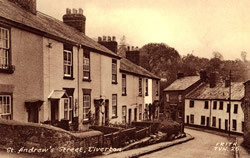
St Andrews St, Tiverton, where Frances was living in 1939
Lucky Poachers?
On 23 January 1889 at Crediton Petty Sessions James Heard and six other youths from Crediton were charged with poaching, after they had been found by PC Clinnick in possession of ferrets, two terrier dogs and a dead pheasant. They claimed they had been innocently ratting, and had found the pheasant dead, lying in the road. The court heard that General Buller had been shooting nearby that day. When the magistrates retired to consider their verdict they found shot in the bird. The magistrates dismissed the case, giving the defendants the benefit of the doubt under the circumstances, although they said it was a case of great suspicion against them.Miller Willing - revenge backfired!
Richard Willing was born in Loddiswell in about 1820, eldest son of miller Richard and Amy Willing of New Mill, Loddiswell. Willings had been and continued to be farmers around Loddiswell for generations, but our Richard's father seems to have been the first of the family to become a miller. Son Richard determined to follow in his father's footsteps, and in 1841 he was working as a servant at Washbrook Mill, Dodbrooke, where Phillip Hingston was miller. Richard married Phillip's daughter Jane in 1843, by which time he had himself learned the trade and was a miller, at Chittlesford Mill, Halwell. Jane bore Richard two children, John and Dorothy, but she died in childbirth in 1845; the child Dorothy died too. Richard did not grieve long. On 22 January 1846 he married Elizabeth Harley in Dean Prior. Elizabeth also bore Richard two children - Richard and Mary. In 1848 Richard and Elizabeth took on the lease of Lurgecombe Mill, Ashburton, where Elizabeth too died, in 1849, probably in childbirth again.
Richard did not allow the grass to grow under his feet, and was remarried in a little over a year - this time to Susanna Sherwill, of Widecombe. The 1851 census finds Richard and Susanna still at Lurgecombe Mill, with 2 year-old Mary. Richard's sons are both with their grandparents in Loddiswell. Soon after this, disaster seems to have struck the family. By the beginning of July 1851, Richard was declared bankrupt. The bankruptcy hearings were completed by the end of July. His response was to leave the country. We next meet him in Canada East (Quebec) in the 1851 census, which in Canada was in fact taken in January 1852. Son Richard and daughter Mary accompanied Richard and Susanna to the New World, but eldest son John Hingston Willing stayed with his grandfather in Loddiswell.
The Willings were sharing a log cabin with another emigrant family in the parish of Saint Malachie, in Beauharnois County at the time of the census. Richard described himself as a miller, and it is at this trade that he seems to have worked in Canada. But in a few years he was in trouble again. By the 1861 census he was in Frontenac County, Canada West - incarcerated in the provincial penitentiary in Portsmouth Village (now Kingston Penitentiary). He had been tried in April 1858 for arson. The crime was committed in Leeds and Grenville, a nearby county in Ontario. Richard had been employed as a miller by Ormond Jones - a prominent Brockville citizen. In November 1857 the Jones mill, at Yonge Mills, was burned down, under suspicious circumstances. The fire had blazed in a part of the mill where there was no source for flames. Nobody was injured, but a considerable amount of money was lost on the under-insured mill.
It emerged at Richard's trial that he had been sacked by Jones for misconduct, and had since been heard to utter threats, on several occasions, against his former employer. Suspiciously Richard had made arrangements to leave the district at about the time the fire was set, but the weather had disrupted his plans. The jury were satisfied that he had carried out his threats against his former boss. He was sentenced to 10 years imprisonment.
The prison regime in Kingston allowed no talking; Richard seems to have found it particularly difficult to comply with the regulations. During his sentence he was often punished for his disruptive behaviour. He seems to have been, like Chaucer's Miller, a garrulous man with a coarse nature. His sins "talking in Church the whole time of the Morning Service" and later "for continuing most disgusting conduct purposely breaking wind". His punishments were mostly bread and water diet, or loss of bedding: on one occasion long term solitary, and finally in April 1865 "four dozen lashes with the cats and be confined to the Dark Cell till further orders " Perhaps this did for him. He died in the penitentiary on 5th June 1865, of consumption according to the burial record, but of typhoid according to the prison autopsy. Perhaps a death by typhoid was to be kept secret. He was buried the same day in a common grave.
Later with his brother he built a five storey stone flour mill at nearby hamlet Yonge Mills - it was the largest mill in Canada when it was built. Trade from the mill helped the village grow into a thriving community such that it outgrew nearby Brockville. Son Ormond inherited the mill. Like his father before him, Ormond was a successful business man, local politician and lawyer. He ultimately became a judge. After the fire, the mill was never rebuilt: derelict for many years, it was converted into farm buildings. By 1966 the community of Yonge Mills was all but abandoned, and the village was swept aside for the building of Highway 401.
Harry Pickett in Court Down Under
Harry Pickett certainly seems to have led a life packed with incident. He avoided the divorce court in England by migrating to Australia in 1879. But there he was obliged to make three very different court appearances. Tantalisingly we do not have the full story for any of them.
On 24 February 1887, Harry appeared in the Insolvency Court of Sydney. Described as a clothier's assistant, he had debts of £1338.14. 9d, and assets of £5.0.0d. Presumably he was declared bankrupt.
Then on 8 December 1887 Harry was charged in the Central Police Court with embezzlement of £2.0.0 from his employer James Harris ("The Tailor"), then of Park Street, Sydney. Harry was described as a travelling commission agent. He was remanded on bail until the January Quarter Sessions. When he appeared on 8 February 1888 the presiding judge directed the jury to dismiss the case as there was no case to be answered and accordingly the jury found him not guilty.
Harry's third court appearance
was a result of the incident as reported in the cutting above. Bizarrely, on November 18 1890, he walked into a police station and declared that he had taken poison in an attempt at suicide, as he was tired of life, apparently after a domestic row. A police officer took him to the Prince Alfred Hospital, where he was admitted, and a stomach pump administered. On 20 May 1891 he appeared at the Central Police Court charged with attempted suicide. He had been in hospital since the incident, suffering from partial paralysis in his legs as a result of the poison, which appears to have been "arsenite of copper". Harry apologised for his actions, but reserved his defence. He was bailed to appear at the Quarter Sessions. Thus another court appearance on 11 June 1891, when Harry pleaded guilty to Attempted Suicide. He was bound over in his own recognizances in the sum of £40 to be of good behaviour for 12 months. These days we would not regard Harry as guilty of any criminal offences. He died of a stroke on 2 September 1908, aged 59.
Fines and misdemeanours
| Great Uncle Sam Haydon was charged in November 1894 with embezzlement when he failed to hand over to his employer 4s 7½d he had taken for goods he delivered to a customer, claiming she hadn't paid. She produced a receipt. He was bound over. |
| Thomas Bubear was summoned for being drunk at Crediton by P.C.Harvey on 25 March 1890. He was fined 2s 6d and costs. |
| For causing an obstruction of Cheltenham Promenade by leaving her car parked there for 2 hours on the evidence of P.C. Edmunds, on May 9th 1933, Leonore M de Chanval Pellier was fined 10s . |
| In Wanganui, New Zealand, Richard Marshall was found guilty of allowing the chimney of his house to take fire on 5 March 1879. He was fined 5s, with 7s costs. |
| At Chulmleigh Sessions on 4 February 1913, grandfather Nicholas Pitts was fined 6s 6d for allowing a dog to be on the highway during prohibited hours. |
| On 2 Sep 1875 at Crediton petty sessions, John Heard was fined £5
for giving two women a ride in his cart without a licence. That was
later reduced to £2, because it had been his boy who gave the women
the ride, unaware that he was committing an offence. |
| Alfred Frayling ran up against authority somewhat when he was serving in the Royal Engineers in the First World War. In 1915 Sapper Frayling was admonished for being late on parade; in 1916 he was fined 10 days pay for insolence to an NCO, and in 1918 was given 5 days Field Punishment No 2 for disobedience of orders, namely burning a naked light in his tent. |
| On 2 December 1899 at Crediton Magistrates Court, Frederick Hatten of Sandford was fined 5s with costs for being drunk. |
| Edwin Charles Lancelles, landlord of the Cruwys Arms, Cruwys Morchard, was fined 15s at Tiverton magistrates court for allowing his dog to stray after dark, on 17 February 1931. |
| George Fey faced two charges at Crediton petty sessions on Thursday 14 July 1870. Found guilty on both counts he was fined 10s plus costs for trespassing on land belonging to John Quick, and 40s plus costs for assaulting gamekeeper George Walker - in all £3.3.6d |
| On 7 February 1850, Ann Bubear, described as of weak intellect but with a deal of cunning, was fined 2s 6d and cautioned for trespassing on a plantation belonging to Sir H. Davies, Bart, M.P., cutting wood, with three other women. They gave false names and addresses and were not apprehended, but Ann was known to the gent who reported them. She was given time to pay. |
| Reginald Edworthy was fined 20s and his licence endorsed for driving without due care and attention, on December 5 1934. Reginald had reversed his lorry 308 feet on a main road at Barnstaple Cross, Crediton, reversing into a parked car as he did so. |
| And on Wednesday 8 September 1943 our same cousin Reginald Edworthy was fined £1 with 15s costs for careless driving , when he overtook a tractor as they approached a bend at Newton St Cyres, causing an army staff car coming in the opposite direction to collide with him. |
Henry Heard of Morchard Bishop, who did not appear in court, was fined 1s and costs for being drunk on 8th October 1894. |
| Oliver Gutteridge lost his temper with fellow farm worker Joseph Shaw, after Shaw had criticised his work. Gutteridge knocked him down and assaulted him, causing Shaw to miss work and several days' pay. Gutteridge was fined £1 with £1 costs on 14 January 1933. Gutteridge led a far from innocent life. But in 1917 , when he was a 14 year old pit boy, and he was fined 2s 6d by Atherstone Magistrates for wasting bread, by feeding it to his rabbits to fatten them for Christmas, his own bread from his lunch box, what did he think when he was told that bread was for humans and must not be wasted in that way? The profound stupidity of the Bench, in words and actions, with no awareness of the irony of their punishment, may well have had some impact on Gutteridge's opinion of Law and Order. |
The Farthings - a Family of Felons?
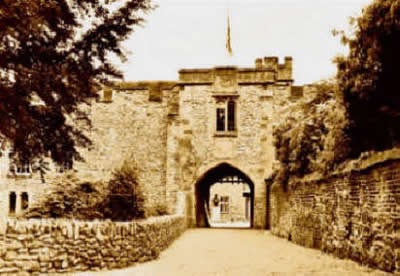 We first encounter Thomas Farthing in Taunton Castle (left) at the Quarter Sessions in 1819, when he was found guilty of stealing " ten hundred weight of oak cleft wood, value 7s 6d, two hundred weight of elm cleft woof value 1s 6d, one iron cross axe value 4s and one hogshead cask value 10 s" - a value totalling more than two weeks wages for an agricultural labourer of the time. Thomas was sentenced to 12 months hard labour and 1s fine.
We first encounter Thomas Farthing in Taunton Castle (left) at the Quarter Sessions in 1819, when he was found guilty of stealing " ten hundred weight of oak cleft wood, value 7s 6d, two hundred weight of elm cleft woof value 1s 6d, one iron cross axe value 4s and one hogshead cask value 10 s" - a value totalling more than two weeks wages for an agricultural labourer of the time. Thomas was sentenced to 12 months hard labour and 1s fine. He and his family would certainly not be regarded as major villains these days, indeed we would regard this as petty theft. However, the family seemed to have planned some of their crimes; others were opportunities seized, and one might suspect they always had an eye for the main chance.
Thomas was not the only member of his family to acquire a criminal record. In 1825 his wife Mary was on remand in Ilchester gaol for "want of sureties" - we do not know her crime. In 1827 she was again on trial, this time for stealing 5 earthenware jugs at Wincanton Fair, aided and abetted by her 12 year-old daughter Sarah, and "Aunt Ann Read". Sarah was judged to have been under the influence of her mother and was freed. Mary, however, was committed to trial at the Quarter Sessions, where she was sentenced to three months in Wilton House of Correction. In 1828, son Charles, aged 16, was sentenced to four months gaol, with two weeks solitary and twice whipped for stealing hay. He was released in August 1828. Thomas seems to have taken his paternal duties serious enough to try to help his son, as he was charged with "feloniously rescuing out of the custody of James Willis, tythingman [constable], one Charles Farthing, who had been committed for a felony". Thomas's attempt was unsuccessful, as he appeared at the same Wells Quarter sessions as his son, on 14th April 1828, when he was also sentenced to four months imprisonment, and to be twice whipped.
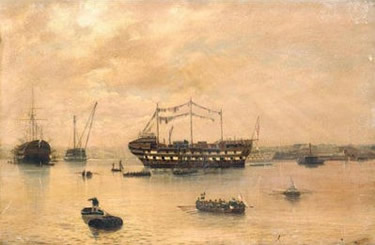
Later, in 1836, daughter Frances was sentenced at Wells Quarter Sessions to two calendar month's imprisonment, apparently for assault. But by the time of Frances's imprisonment, the Farthing family had already paid a heavy price for their criminal activities. Six years earlier in 1830, Thomas had been accused of stealing 50 sheaves of newly reaped wheat belonging to John Gatehouse, gentleman of North Cheriton, Somerset. Unfortunately for Thomas his next door neighbour James Holly testified against him. "I heard a cart stop at the prisoner's door about 3 in the morning of yesterday ... and saw the prisoner with the cart ... loaded with wheat. I saw the prisoner carry the wheat ... into his house. When I got up afterwards about a quarter before 5, I saw the prisoner's daughter brushing the wheat which had fallen from the sheaves from the door. On seeing me she drew back" Inside the house attempts had been made to disguise the stolen grains, as leazed corn (gathered by villagers from the ground after the harvest), and by mixing in poorer quality grain with the stolen wheat. But 4 sacks of wheat were identified as that belonging to Gatehouse. This had all the appearance of a calculated crime. Thomas was convicted and was sentenced to be transported "beyond the seas" for life, on 30th October 1830. The sentence was not to be carried out. In November 1830 Thomas was sent to await transportation in the prison hulk Captivity at Devonport. (right) Conditions on the hulks were appalling. They were filthy, and disease-ridden. Epidemics of typhoid and cholera were commonplace. As many as a third of the prisoners held on hulks died of disease . Thomas Farthing was one of those who succumbed. His death is recorded on 30 June 1831. The rest of the family survived, and from Frances's line a Farthing was to marry a Heard four generations later.
More Victims of Crime - the Cruwys Arms
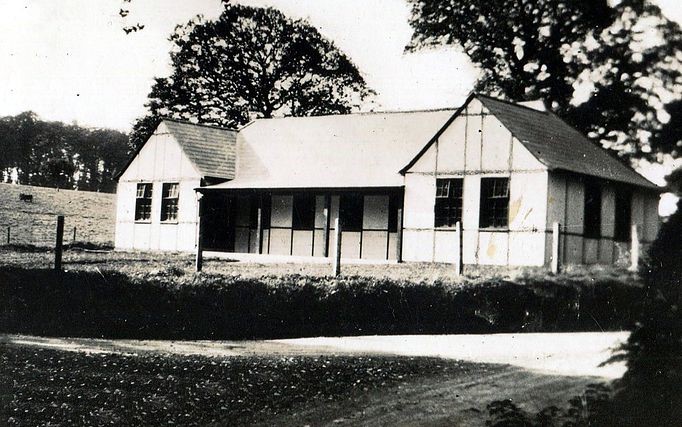
Men's Clubroom, Cruwys Morchard
Not to Forget the Long Arm...
To keep the picture balanced, I must point out that a good number of our family members were police officers, most of whom are listed below. As well as those who have passed on, there are several living family members who are or were in the police service, who have been omitted here.
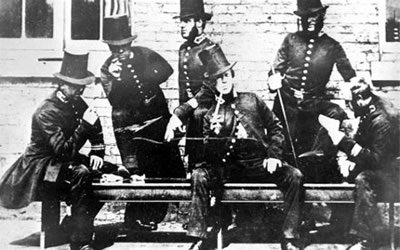
Name |
Life Dates |
Highest Rank* |
Location |
Notes |
|---|---|---|---|---|
Jonathon Gown |
1818-1876 |
Night Watchman/Police Constable |
City of London Police |
Served in early 1850s |
Silas Pugsley |
1820-1889 |
Police Constable |
City of London Police |
Former Coldstream Guard, wounded at the Battle of Inkerman before he joined the police. |
John Stone |
1830-1875 |
Police Constable |
Devon County Constabulary |
Received a gratuity of £50 in 1874 |
John Slee |
1836-1909 |
Police Constable |
Devon County Constabulary |
Stationed at Holsworthy. At age 65 was police pensioner in Plymouth |
John Labbett |
1839-1905 |
Police Constable |
Metropolitan Police |
Warrant number 55524. Joined 17 June 1872,
serving in Devonport Dockyard, then included in the Metropolitan
Police. Retired 21 Aug 1891. Last posted to D Division
(Marylebone) as a PC . |
John Plimmer |
1840-1896 |
Police Constable |
Railway Police |
In Wolverhampton in 1881 |
John Lloyd |
1849-1917 |
Detective Sergeant |
Metropolitan Police |
Police pensioner in 1911 |
William Coles |
1861 - 1932 |
Superintendent |
Devon County Constabulary |
Served in South Devon then in East Devon. In
1911 he was on "Special Duty" ( for the "Tonypandy riots")
staying in an hotel in Tonypandy with another Superintendent
from North Wales, and an Inspector from Somerset. He
retired in May 1914. |
Arthur Newcombe |
1865-1948 |
Police Detective Officer |
Bristol Constabulary |
Was latterly a Constable in the Railway Police |
James Drew |
1868-1945 |
Constable |
Devon County Constabulary |
Joined in 1891, retired in 1906 |
Jabez Voss |
1874-1944 |
Inspector |
Borough of Plymouth Police |
Retired in 1928 |
Gerald Manning Goding |
1876-1936 |
Police Constable |
Queensland Police Force, Australia |
He was a police constable at the time of his marriage in 1901. Later he worked on the railways. |
| Alfred Snow | 1880-1963 | Special Constable | Devon County Constabulary | He was awarded a bar to his Long Service and Good Conduct Medal after 20 years continuous service, in December 1940 |
Frank Conbeer |
1884-1971 |
Police Constable |
Devon County Constabulary |
Stationed at Crediton for some time |
Inspector John Mitchell |
||||
John Mitchell |
1886-1975 |
Inspector |
Breconshire Constabulary |
In the Coldstream Guards from 1906 to 1913, when he joined the constabulary. Recalled to the Guards in 1914 he served in the military until 1919 then rejoined the police. In 1931 arrested murderer George Scoble. He retired in 1939. |
Merlin Conbeer |
1887-1945 |
Sergeant |
Devon County Constabulary |
Served in the Constabulary from 1908 -1934, and War Reserve Constabulary 1939-1944 |
Harry Daw |
1887-1954 |
Police Constable |
Queensland Police Force, Australia |
He joined in 1913 and left on 31 July 1919. |
Arthur Wright |
1888- 1979 |
Police Constable |
Liverpool City Police |
|
Herbert Pickett's Special Constable Long Service and Good Conduct Medal |
||||
| Herbert Pickett | 1891-1949 | Special Constable | Devon Constabulary | As well as being a pork butcher, and running a smallholding, Herbert was a Special Constable. He was awarded a Long Service and Good Conduct Medal. |
| Frederick Bowden | 1892-1935 | Police Constable | GWR Police | He was an "Old Contemptible" who joined the Cardiff Dock police on his demob, and served there until his death in 1935. |
| George Gumm | 1892-1954 | Police Constable | Metropolitan Police | Warrant number 102454. From Ilfracombe he joined the Met on 3 March 1913,was at Dalton police station N2, when he married Annie Heard, and left on 1 Aug 1919. Last posted to J Division as a PC. |
| George McClements | 1894- 1979 | Detective Inspector | Metropolitan Police | By coincidence was involved in the investigation of two notorious murders, featuring dismembered bodies, in the Charing Cross Trunk Mystery in 1927, and the Brighton and Kings Cross Stations Left Luggage Office Mystery in 1934. |
| Ernest Newcombe | 1895- 1965 | Police Constable | Manchester City Police | |
| Stanley Giles | 1895-1976 | Private | Canadian Mounted Military Police in France during WW1. | In the 89th Battalion, he was hospitalised with pneumonia, and discharged. |
| James Mitchell | 1897-1980 | Police Constable | Monmouthshire Constabulary | Brother to Inspector John Mitchell |
Maurice Plaice |
1898-1968 |
Sergeant |
Bristol Constabulary |
Joined Bristol Constabulary in May 1920. Promoted to Sergeant in
"B" Division on 2 April 1936. |
| Albert Hatten | 1894-1982 | Special Constable | Devon Constabulary | |
Alan Ferguson |
1906-1954 |
Detective Constable |
City of Glasgow Police |
Served from about 1924-1954. Graduated with LLB whilst a serving officer thanks to far-sighted support from a Chief Constable who encouraged young officers to go to university. |
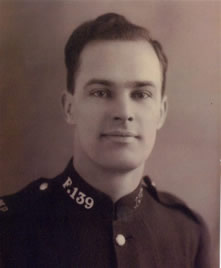 P.C. Jack Labbett Metropolitan Police |
||||
Jack Labbett |
1907-1996 |
Police Constable |
Metropolitan Police |
Joined in 1928 |
Herbert Slee |
1914-1995 |
Inspector |
Metropolitan Police |
|
Charles Procter |
1928-1991 |
Police Constable |
Metropolitan Police |
|
John Domaille |
1934-2020 |
Assistant Chief Constable |
West Yorkshire Constabulary |
Also served in Devon before moving North. Led Yorkshire Ripper enquiry for a while, and was involved in the Hillsborough enquiry. |
 P.C.Arthur Wright Liverpool City Police |
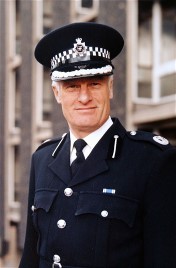 Assistant Chief Constable of West Yorkshire, John Domaille OBE |
|||
* Highest rank for which records have been found, not necessarily the highest rank attained |
||||

